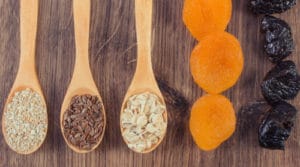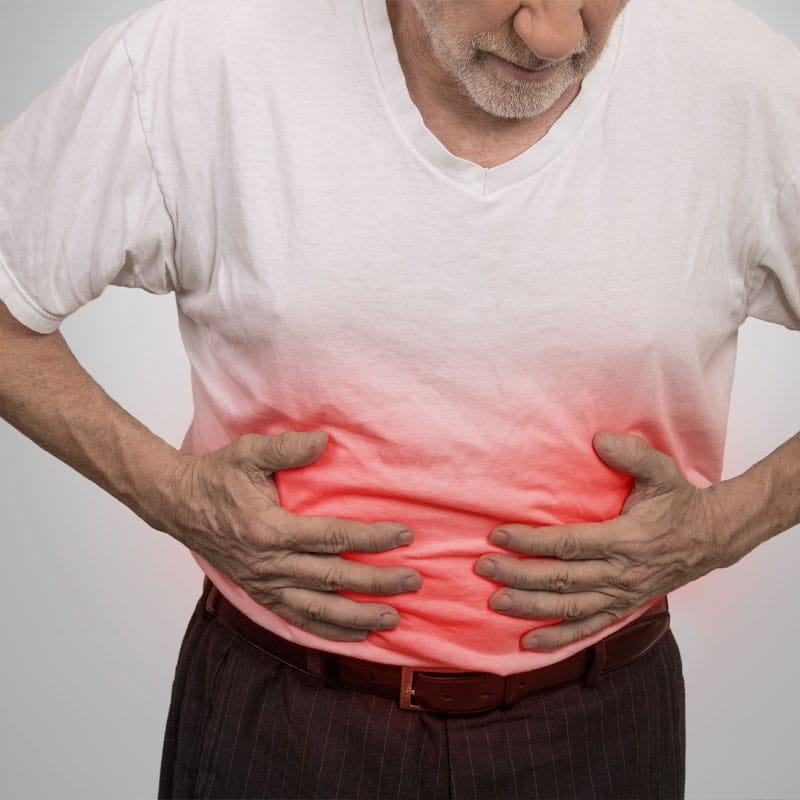Most people know that their diet not only influences their weight but also affects their health. Being overweight increases your risk of developing type 2 diabetes, heart disease, sleep apnea, high blood pressure, cancer, and other serious health conditions. You can increase the success of your weight loss efforts by incorporating more fiber into your diet.
How Much Fiber Do You Need to Each Day?

Types of Fiber
There are two kinds of dietary fiber – soluble and insoluble fiber. Each type of fiber offers a number of weight loss benefits, including:
- Insoluble Fiber – Insoluble fiber aids in digestion and helps with regularity. Insoluble fiber is found in whole grains, fruit and vegetable skins, and green veggies. Insoluble fiber does not dissolve in water. As it travels through the digestive system it whisks away waste, which helps reduce inflammation and bloating.
- Soluble Fiber – Soluble fiber is found in root vegetables, most fruits, oats, barley, beans, and legumes. Soluble fiber combines with water to create a gel-like substance that feeds the healthy bacteria in your digestive tract. Soluble fiber helps manage weight by reducing the amount of fat that is absorbed from a meal.
Benefits for Eating Fiber
- Fiber Regulates Gut Bacteria for Enhanced Weight Loss
Over 100 trillion bacteria reside in your digestive tract, making up your gut microbiome. Different types of bacteria found in your gastrointestinal tract perform different roles, including weight management, blood glucose regulation, brain function, and immunity. Fiber travels through the digestive tract and feeds the friendly bacteria found there. As the fiber is consumed by the friendly bacteria usable energy is produced.
Chronic inflammation is often associated with weight gain. One way to counteract this is to improve the number of beneficial bacteria in the gastrointestinal tract. The healthy bacteria in the digestive tract are used to help reduce inflammatory markers in the bloodstream, which can help counteract the effects of inflammation on weight.

In order to lose excess weight, you must burn more calories than you eat in a day. Many people try to count calories to help with weight loss. Unfortunately, many times dieters feel hungry when trying to reduce caloric consumption. Fiber helps suppress your appetite and keep you feeling fuller longer.
Fiber also slows down digestion, absorption time, and the emptying of your stomach. Because food remains in your stomach longer, your appetite will be significantly reduced. To improve your weight loss efforts, ensure you are drinking plenty of water because it will combine with the fiber to improve satiety.
Finally, fiber has been shown to target belly fat. Abdominal fat is regarded as the most dangerous kind of fat. It surrounds vital organs and has been linked to metabolic disease.
How to Get Enough Fiber?
The National Institute of Health reports that 95 percent of Americans are not eating enough fiber. Most of your fiber should come from the foods that you eat rather than a supplement. Some of the top fiber filled foods include fresh fruits and vegetables, whole grains, nuts and seeds. Here are some tips to help you increase your fiber consumption.
- Opt for whole fruits rather than fruit juices
- Eat the skins of your fruits and veggies
- Choose whole grain bread rather than white bread
- Switch your white rice for brown rice
- Snack on healthy seeds and nuts
- Eat oatmeal as a part of a healthy breakfast
- Add lentils or beans to your meal
- Snack on crisp vegetables instead of chips
Best Sources of Fiber
Choosing the best foods for weight loss can be difficult. You have to consider the caloric count, the nutritional value of the food, and how it impacts your digestive health. There are many wonderful and delicious sources of fiber that can help you lose weight and keep it off. Let’s look at the top fiber sources to incorporate into your diet.
Beans – Beans are an excellent source of fiber and may help you in your weight loss efforts. Some common beans to incorporate into your diet include white beans, navy beans, pinto beans, garbanzo beans, lima beans, and kidney beans.
Fruits – There are a number of fruits that can increase your fiber intake, including berries, mangoes, guavas, apples, oranges, and bananas.
Legumes – Incorporating legumes into your diet can help with weight loss. Choose lentils, soybeans, and peas to increase your fiber consumption.
Nuts and Seeds – Eating nuts and seeds can increase your fiber consumption; however, you must be careful because they can be high in calories and sabotage your weight loss efforts. Some common nuts and seeds to incorporate into your diet include almonds, pistachios, walnuts, pecans, pumpkin seeds, and sunflower seeds.
Popcorn – Popcorn is a great snack when trying to lose weight. A 3 cup serving of air popped popcorn contains less than 100 calories and provides you with 4 grams of fiber, making it a great snack when dieting.

Vegetables – Darker colored vegetables generally tend to have a higher fiber content than other veggies. Some of the top veggies to include in your diet include artichokes, broccoli, beets, carrots, collard greens, and potatoes, including red, russet, and sweet potatoes.
Whole Grains – Whole grain bread like pumpernickel, rye, and wheat are filled with fiber. Eating these in addition to brown rice and barley can help with your weight loss efforts.
Looking for Healthy Sustainable Weight Loss
Ensuring you are getting at least the recommended amount of fiber is an effective strategy for weight loss; however, it is important to make healthy, lasting lifestyle changes. Our integrative practitioners specialize in healthy and sustainable weight loss. They will help you develop a dietary plan and guide you toward making healthy choices including incorporating stress relief practices into your day to day life, regular exercise, and how to get a full night’s sleep. Contact us today to begin your journey towards improved health, reduced weight, and a longer life.





















